|
The
Disease of Novelism
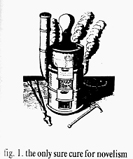 The one indispensable point in a sensational novel
is that it should contain something abnormal and unnatural;
something that induces in the simple idea a sort of thrill...
This drop from the empire of reason... a consistent appeal
to the animal part of our nature, and avows a preference
for its manifestations, as though power and intensity
came through it.
The one indispensable point in a sensational novel
is that it should contain something abnormal and unnatural;
something that induces in the simple idea a sort of thrill...
This drop from the empire of reason... a consistent appeal
to the animal part of our nature, and avows a preference
for its manifestations, as though power and intensity
came through it.
-The Christian Remembrancer
One of the
few redeeming qualities of today's youth is their avoidance
of novelism. Novelism, the reading and (in its advanced
stages) the writing of novels, appears finally to be
dying out -- and decent folk can only breathe a sigh
of relief at the elimination of this degenerate pastime
from the body politic.
Girls
are to be kept away from those activities of civilization
that over-stimulate the imagination and the senses,
such as fashionable novels, paintings, music, balls,
theaters... as this can lead to uterine epilepsy, sapphic
tastes, and nymphomania.
- Forbidden
History
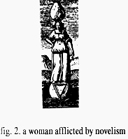
The novel
is no more than an extended deceit, a ludicrous lie
that consumes both the reader and the writer. A novelist
takes the dubious parlor trick of storytelling and attempts
to breathe false life into false people -- and is praised
when his "characters" approach a semblance of real humanity.
This unholy
reanimation hasn't been so seriously pursued (and so
sanctioned) since the days of the alchemists. Their
pursuit of Elixirs of Eternal Youth were just as deranged
and just as pathetic. And frighteningly, alchemy reared
its deathless head across the millennia in China and
then England.
In contrast,
novelism is a mercifully young practice, and its natural
death will be a secret relief to all. The parents, dignified
Poetry and the wanton Tall Tale, will be able to divide
their lives once more -- and stay on their own sides
of town.
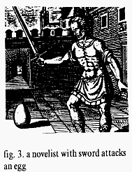 One powerful argument against the validity of alchemy
is the fact that its supposedly successful practitioners
do not seem to have become wealthy men.
One powerful argument against the validity of alchemy
is the fact that its supposedly successful practitioners
do not seem to have become wealthy men.
- Man,
Myth and Magic
But there
is very little profit in novelism, while alchemy had
an economic incentive -- this is surely the key in understanding
its popularity. Turning lead into gold is a reasonable
goal for any young man. While some novelists claim a
similar transformation takes place when they turn the
base clay of their daily existence into golden pieces
of prose, we can only shake our heads in dismay. Why
will some insist on pushing a metaphor past the breaking
point? And can the meager advances that an average novelist
commands be said to be gold? Wouldn't brass be
a more accurate measure?
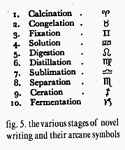
Mercury
was a material used constantly in alchemy and it has
been suggested that vapors from heated mercury may have
caused hallucinations.
-Man,
Myth and Magic
And here
we come to a possible explanation to the grandiose claims
of that pitiable anachronism, the novelist. Despite
the ease and accessibility of filmic storytelling, he
insists on chipping out a story through text on a page.
Heedless of the engaging interactivity of the computerized
world (AKA"cyber-space") he is fixated on this tired
old warhorse of a medium.
He is obviously
delusional. Perhaps we shall find, centuries hence,
a similar mercurial reason for his condition as we have
for the alchemist: it has been suggested that his stunted
mindstate is a reaction to the hype-rich environment
of our mediated culture.
And such
a reaction! The fevered imaginings of the alchemist,
bent over taffy-stoppered flasks and crusty crucibles,
have nothing on the novelist. Pulling his delusional
ravings from his questionable life experiences, stitching
them together in a patchwork mess he attempts to pass
off as whole cloth, he will work months, even years
on this structure of queer imaginings. Only a man besotted,
truly soaked in the liquor of lies could consider
this a worthwhile pursuit -- forever laboring under
the absurd pretense that what he are doing is (or could
ever be)"novel."
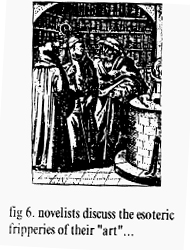 obscurum per obsurius, ignotum per ignotius!
obscurum per obsurius, ignotum per ignotius!
(the obscure
explained by the more obscure, the unknown explained
by the more unknown)
-an
alchemist proverb
In the final
stages before the mental implosion, the novelist may
attempt to evade responsibility. A writer may claim
that his novels are effortlessly conceived, that they
are more an act of channeling than of creation. It is
a short step, then, for the novelist to feel that his
writings not only reflect, but predict, reality.
It's weird...
things I write seem to actually come true. I don't know
if it's because I'm writing about things that could happen,
or I want to happen, or if I'm just plain crazy.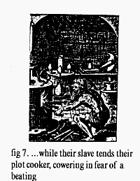
- a typical novelist
Alchemy sympathists
today claim that the religious devotion and fervor
of these misguided men was so intense that lead was
changed into gold not by formula, but through a parachemical
reaction. We also know, however, that their fervor induced
them to stir their mixtures with hollow rods, allowing
them to introduce gold by stealth. It's obvious that
alchemy relied on craftiness more than craft, more on
artifice than art.
We can only
hope that novelism, being similarly shot through with
groundless faith, untruth, and obsession, will soon
crumble into a like obscurity.
|